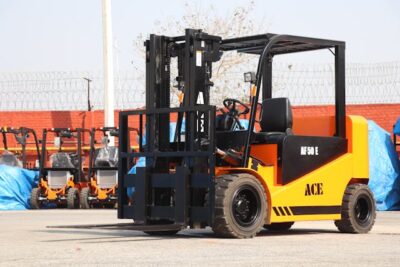Forklifts keep businesses moving, but should you go with electric or gas-powered? It’s not always an easy choice.
Electric forklifts are quieter, produce zero emissions, and require less maintenance, making them great for indoor use. On the other hand, gas forklifts offer more power, faster refueling, and the ability to handle heavy loads in outdoor environments.
Both have their strengths, so the right choice depends on your budget, work environment, and operational needs.
Overview of Electric Forklifts
Rechargeable batteries power electric forklifts and have gained popularity due to their efficiency and eco-friendly benefits. They are commonly used indoors but can also be adapted for outdoor applications.
Areas in New South Wales, for example, require operators to have a licence when operating these machines. Because of this, operators must first take on courses for a forklift licence newcastle and nearby cities offer. Similar licensing requirements exist in other countries such as the UK, Canada, and Australia.
Advantages of Electric Forklifts
Electric forklifts have fewer moving parts, leading to reduced maintenance costs. They don’t require fuel, making them more cost-effective in the long run. Since they run on electricity, electric forklifts produce zero emissions, making them a greener choice. This is especially important for businesses prioritizing sustainability.
Additionally, electric forklifts operate more quietly than gas-powered models, reducing noise pollution in the workplace. With proper maintenance, electric forklifts have a longer lifespan than gas models. The absence of emissions and low noise make them ideal for warehouses and manufacturing facilities.
Disadvantages of Electric Forklifts
Electric forklifts are generally more expensive than gas models due to the battery and charging infrastructure cost. Batteries require time to recharge, which can lead to downtime if not managed properly.
While some models are designed for outdoor use, electric forklifts may struggle in harsh weather conditions or rough terrains. Over time, forklift batteries degrade and need to be replaced, which can be expensive.
Overview of Gas Forklifts
Gas-powered forklifts, which include models that run on propane, diesel, or gasoline, are known for their power and versatility. They are commonly used in outdoor settings and heavy-duty applications.
Advantages of Gas Forklifts
Gas forklifts provide more power and higher torque, making them ideal for lifting heavier loads. Unlike electric forklifts, which require hours to recharge, gas-powered models can be refuelled in minutes, minimizing downtime.
Gas forklifts perform well outdoors, including rough terrains and extreme weather conditions. Gas models are generally less expensive to purchase than electric forklifts. These forklifts can handle various applications, from warehouses to construction sites.
Disadvantages of Gas Forklifts
The fuel cost can increase over time, making gas forklifts more expensive than electric models. Gas-powered forklifts have more moving parts, leading to higher maintenance costs and frequent servicing. Gas forklifts produce exhaust emissions, which can concern indoor use and businesses focused on reducing their carbon footprint.
Additionally, gas forklifts are louder than electric models, which can contribute to a noisy work environment.
Key Factors to Consider When Choosing Between Electric and Gas Forklifts
When deciding which type of forklift is right for your business, consider the following factors:
1. Work Environment
Electric forklifts are better suited for warehouses and enclosed spaces due to their zero emissions and quieter operation. On the other hand, gas forklifts excel in outdoor environments and rough terrains.
2. Cost Considerations
Gas forklifts tend to have a lower upfront cost. However, electric forklifts are cheaper to maintain and operate long-term due to lower fuel and maintenance costs. It is also essential to consider the cost of replacing electric forklift batteries every few years.
3. Load Capacity and Performance
A gas forklift may be the better option if your business requires heavy loads frequently due to its higher power and torque. However, an electric forklift will be sufficient if lighter loads and precision handling are a priority.
4. Downtime and Productivity
Gas forklifts offer quick refuelling, which is beneficial for operations that require continuous use. In contrast, electric forklifts need charging breaks, so businesses with multiple shifts should consider having extra batteries or implementing a battery swap system.
5. Environmental Impact
Electric forklifts are the choice if your company prioritizes sustainability and eco-friendly operations. Gas forklifts, while more powerful, contribute to emissions and environmental concerns.
6. Space and Infrastructure
Electric forklifts require charging stations, which may require space and investment. Gas forklifts need proper fuel storage and handling, which may require compliance with safety regulations.
Which Forklift is Right for Your Business?
The best forklift for your business ultimately depends on your specific needs. Here’s a general guideline:
- Choose an Electric Forklift if You primarily operate indoors, prioritize sustainability, want lower long-term costs, and can accommodate charging infrastructure.
- Choose a Gas Forklift if You need high power for heavy loads, operate in outdoor environments, require quick refuelling, and have a limited budget for initial investment.
Final Words
Both electric and gas forklifts have their strengths and weaknesses. Understanding your business’s specific requirements, including budget, work environment, and operational demands, will help you choose. Whether you opt for an electric or gas-powered model, ensuring proper maintenance and operator training will maximize efficiency and safety in your operations.












